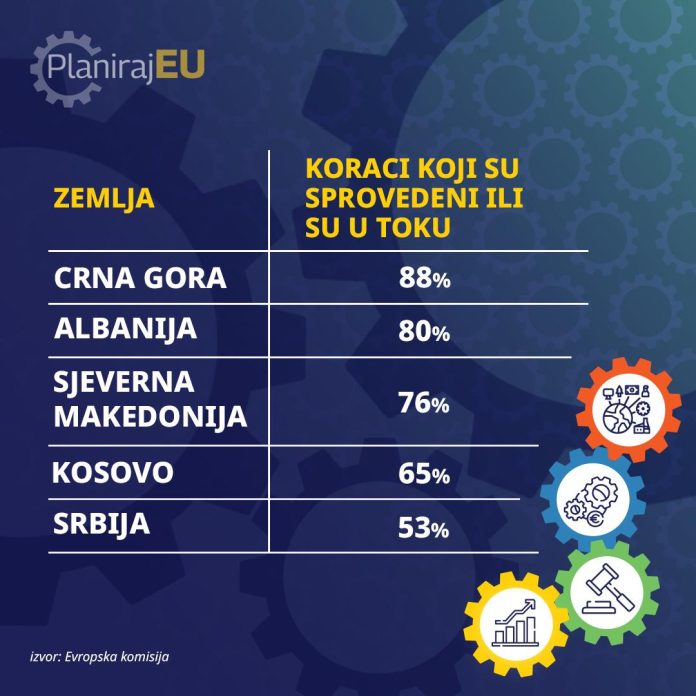Montenegro ranks first in the region with as much as 88% of fulfilled and soon-to-be-fulfilled commitments from the Reform Agenda for the EU Growth Plan for the Western Balkans. It is followed by Albania with 80%, North Macedonia with 76%, Kosovo with 65%, and Serbia with 53%, stated Gert Jan Koopman, Director-General for EU Enlargement and Eastern Neighborhood at the European Commission (DG ENEST), at the Western Balkans Leaders’ Summit on the Growth Plan held in Skopje.
Speaking at a panel that gathered ministers for European affairs from the Western Balkans, representatives of the EU, regional organizations, and partners, Koopman emphasized that all Western Balkan countries are diligently meeting the tasks set out in their Reform Agendas, and further improvement is expected by the end of the reporting period. “The Growth Plan for the Western Balkans is already bringing tangible benefits to citizens and the economies of the region, and countries have shown strong commitment in implementing reform obligations,” he said.
At the panel dedicated to the implementation of Reform Agendas for the EU Growth Plan for the Western Balkans, Minister of European Affairs Maida Gorčević stated that the presented results confirm Montenegro’s strong political will and its capacity to carry out reform processes quickly and efficiently. She spoke about Montenegro’s experience and highlighted the importance of linking the EU accession process with concrete economic benefits for citizens and businesses.
“For Montenegro, accession negotiations and the Growth Plan are no longer separate processes – they represent a unified framework for accelerated integration,” said Minister Gorčević. She emphasized that the recent closure of Chapter 5 – Public Procurement, the first in the Fundamentals cluster, further strengthened optimism within institutions, and that the majority of work – both in terms of closing negotiation chapters and implementing the Reform Agenda – is expected in the next 18 to 24 months.
Speaking about regional initiatives, the Minister specifically highlighted the importance of Montenegro joining the Single Euro Payments Area (SEPA).
“SEPA is not only a technical achievement, but a strategic milestone. Our citizens can now send and receive money from the EU quickly and without high fees, and our businesses – especially small and medium-sized enterprises – can operate more easily and compete in the EU market. But the true value lies in the sense of belonging – in the fact that Montenegrin citizens enjoy the same rights as EU citizens,” said Gorčević.
In her address, Minister Gorčević called for joint action within the region and with the EU to use the Growth Plan as a powerful instrument for driving reforms, improving quality of life, and bringing the European perspective of the Western Balkans back into focus.
“The Growth Plan is no longer just a document – it is now a concrete mechanism with the first visible results. It is up to us, from this high political level, to support all actors in our countries to be actively involved in its implementation,” concluded Gorčević.
The panel also presented concrete measures being implemented through the Growth Plan: from digital innovation hubs and infrastructure development, integration into the EU Single Market, to green corridors. New initiatives within the EU Growth Plan for the Western Balkans were also presented: inclusion of the Western Balkans in European tourism networks, introduction of EU consumer protection tools, and Guidelines for accession to the EU Single Market.
On the margins of the Summit, Minister Gorčević held a bilateral meeting with Albania’s chief negotiator and Minister for Europe and Foreign Affairs, Majlinda Duka, during which experiences were exchanged regarding the implementation of the Reform Agenda and acceleration of the accession process. The two officials agreed that intensified knowledge exchange and regional coordination are key to the success of the European agenda for the entire Western Balkans.
Minister Gorčević also participated in a special panel discussion organized by North Macedonia’s Minister of Foreign Affairs, Timčo Mucunski, in cooperation with the Atlantic Council. The discussion focused on security challenges and the role of the Western Balkans in the new European security architecture.
MINISTRY OF EUROPEAN AFFAIRS


